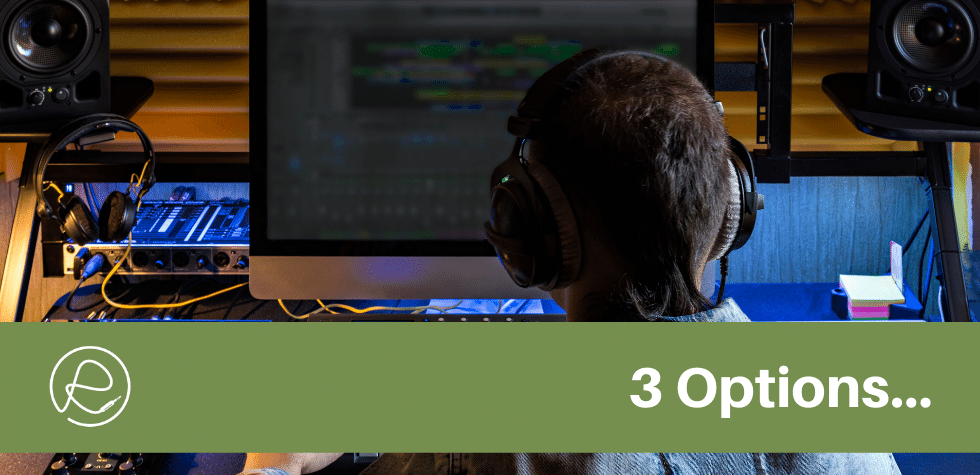25-step music production process checklist and video workshop >>>
A Brief Guide to Music Mastering for Producers:

Music Mastering - What is It? Do I Need It? How Do I Do It? Should I Pay For It? These Questions and More Answered Here..
Music mastering is the final stage of the music production process which follows the mix. Mastering makes your album, EP or single ready for commercial release and distribution.
In the most basic sense mastering is about ensuring your track is fit for purpose. In other words, if your track is meant for the club, you want it to sound good on a club playback system. If your track is meant for release on streaming platforms then you want it to sound as good as possible after upload.
Of course, when it comes to album mastering it's not just about making all the tracks sound as good as possible but also making all tracks consistent with each other.
In this section of the website we look at everything music mastering so you'll know what it is, how it works, why it's important and what your best options are when it comes to mastering your own music or getting it mastered.Let's start with your main options when it comes to mastering for your own music...
Music Mastering - Your 3 Options

Yes, when it comes to mastering your music you have only 3 options. Let's take a look at these...
1. Master Your Own Music
The first option is to master your own music. The main benefit of this route is of course, as you can imagine, that it's free, at least if you already have a DAW and basic studio setup.
Another great benefit of this route is that you have complete control over the entire music production process from start to finish.
The main drawback is however that you don't get a second set of ears to work on your track. If you've ever been in the bubble of producing a track you probably already by now just how valuable a bit of context and perspective can be.
Another thing to keep in mind is that unless you have a ton of mastering experience, a superb listening environment and great gear and plugins, you're most likely not going to be able to do a good job. It's not impossible but highly unlikely.
Check out this post for an introduction to mastering your own music.
2. Hire a Professional Mastering Engineer
This is the preferred option when it comes to music mastering. Leave it to the professionals!
The main benefit is of course the advantage of having a second party there to instantly point out any obvious mistakes you've made while mixing. Never underestimate the bubble you're in when you've been producing a track for weeks. An experienced mastering engineer will instantly hear what's wrong with your mix and tell you how to correct it before you even get to the mastering process.
A good mastering engineer, well-versed in the intricacies of your genre, will however bring much more to the table. With a professional mastering engineer you get...
- The experience.
- The ears.
- The gear.
- The studio.
A fresh perspective...
A good mastering engineer provides you with a second set of ears and a different nervous system. This means they may be able to quite easily pick up issues you don't hear because of your involvement in production or mixing. In other words, obvious issues may not be noted by you since your own nervous system has adjusted to compensate for these issues. The mastering engineer gives you a chance to limit the chance of such issues making it to the final production.
The benefit of experience and skill...
The process of mastering a track, EP or album involves using EQ, compression, phase correction and other tools to create a balanced master ready for public consumption. Mastering involves making very subtle tweaks to your mix, where and when needed. Experienced mastering engineers know which subtle tweaks to make, and when to make them, which something they picked up through experience and practice.
The listening environment and tools...
You'll find different equipment, and often expensive outboard gear in a good mastering studio not present in the normal recording or mixing studios of small studio owners or music producers like yourself. The ability to hear the source material or mix is also vital when it comes to mastering, so proper mastering studios or engineers will spend a lot of money and energy to create the right acoustic environment to work in. This is again something which most producers don't have set up at quite the same level.
Working with a mastering engineer...
I've written a brief music mastering tutorial which shows you how to find a mastering engineer and how to prepare your tracks for the mastering session.Now, as you can imagine, the drawback here is that it will cost more. If you are however serious about your musical legacy and want to make sure the quality is up there with the best then this is a small price to pay.The only caveat I can think of here is that you want to make sure you get a good mastering engineer for the job. At this moment, there is no better option for your music. Find a pro and pay them. Simple!
3. Use Automated Mastering Services
In recent times we've seen the rise of automated online mastering services like Landr, Cloudbounce and Aria.
Now, while your initial reaction may be that these services cannot be that good, you may need to reconsider. Yes, I agree that these services don't, right now, compete with experienced mastering engineers. Will that change? Who knows?
These types of services do however have their place and they keep getting better. Limited budget? Need a quick master to play out this weekend? Want to test your current mix version? Automated mastering may just be what you need.
Check out this post to find out when Landr mastering makes sense.
Frequently Asked Mastering Questions

In this section below you'll find answers to the most common questions you may have about music mastering.
Q: What Does Mastering Mean in Music?
A: Music mastering is the final part of the music production process. It ensures your track, EP or album is ready for release in terms of balance, tone and loudness. Mastering involves different processes which include equalization, compression, enhancements like saturation and stereo imaging and limiting.
Q: Is Mastering Necessary?
A: Yes. Mastering is absolutely necessary if you plan to commercially release your tracks or send them to labels for their consideration.
Your tracks need to stand up to the quality of other tracks in terms of balance, tone and loudness and this is exactly what good mastering accomplishes.
Q: Is Music Mastering Difficult? Can I Master My Own Music?
A: Good music mastering is a skill that comes with practice and experience. So, while it's not difficult when you know what you're doing, it can be difficult to get right when you just start out.
What can make mastering difficult is when you don't have an acoustically fine-tuned listening environment. You have to make decisions during the mastering process and these will be the wrong decisions if your room distorts what you hear in any way.
So, in short, yes, you can master your own music but be prepared for a learning curve and know that you'll have to invest in a well-designed and acoustically treated studio space to work in.
Q: Can Mastering Fix a Bad Mix?
A: Yes and no. A good mastering engineer will be able to at the very least make a bad mix sound better but don't expect miracles. The reason it's harder to fix a bad mix during mastering is because, unless it's stem mastering, the mastering engineer is working with a single audio file. So all adjustments are made to the entire signal. Now, while there are was to kind of separate various parts of the mix it's always better to go back to your mixing stage to fix a bad mix. Most mastering engineers will guide you through this process.
Q: How Much Does Mastering a Song Cost?
A: In most cases you should be able to get decent mastering done for between $50 to $100 per track. This may be higher if you're working with a more well-known mastering engineer.
Automated mastering services such as Landr are much less expensive since there's no engineer involved. Prices differ depending on which subscription you choose. On a per track basis you'll be looking at prices starting at around the $20 level.
Q: Is Online Mastering Any Good?
A: Automated online mastering is getting better and has it's place. It's a bit of a hit or miss thing. Your best bet, if you want professional results, is still however to hire a good mastering engineer who specializes in the genre of music you produce.
Q: How Loud Should a Mix Be Before Mastering? How Do I Prepare for Mastering?
A: Try to keep your peak levels at -6dB to at most -4dB to give your mastering engineer headroom to work with. Always err on the side of lower levels to make sure there's no clipping or digital distortion in your mix.
You can find a quick tutorial on how to prepare for mastering here.
Q: How Loud Should I Master My Music?
A: This is a subjective choice. It depends on your track and genre and also on where you expect the track to be played back. A good general ballpark to aim for when it comes to most streaming platforms is between -13 and -16 LUFS.
Mastering the mix has a great breakdown of this topic.
Music Mastering - Conclusion:
I trust this little intro to music mastering has proven helpful.
You now know the basic 3 options you have when it comes to mastering your music and the basic answers to the most common music mastering questions.
Expect more mastering-related content to be added to this section shortly!
Share this post. Spread the knowledge so other producers can benefit too:
- Renegade Producer
- Music Mastering
ⓘ Some pages contain affiliate links so I might earn a commission when you buy through my links. Thanks for your support! Learn more

